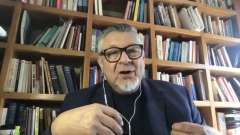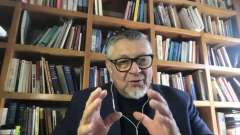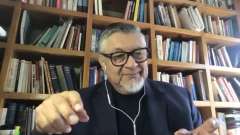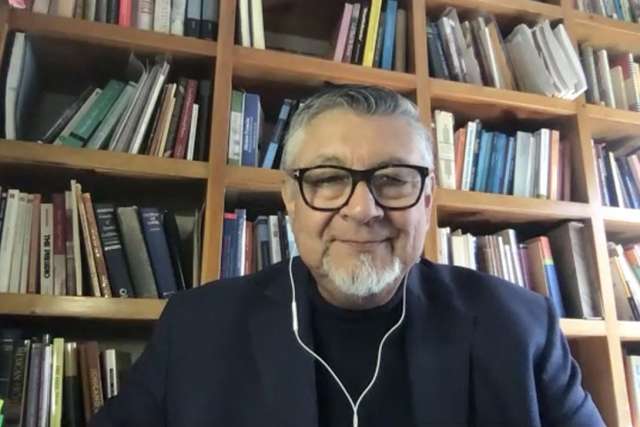When America’s largest minority coughs, David E. Hayes-Bautista, PhD, is there to document it. The director of UCLA’s Center for the Study of Latino Health and Culture in the David Geffen School of Medicine at UCLA is a prolific writer, author and guest on radio and television, all while training the next generation of Latino medical professionals to think of their work as simultaneously academic and advocacy based. So Dr. Hayes-Bautista was ready to chronicle coronavirus from the start. But his job and worldview became even more crucial as COVID-19 disproportionately affected Latinos, who account for about 39% of California’s population but 55% of its coronavirus cases and nearly half of its coronavirus deaths. He was a proverbial lone voice pushing back against a prevailing media narrative that Latinos have been among the hardest-hit groups because, well, they are Latinos. Dr. Hayes-Bautista and his team, via a torrent of policy papers, interviews and even a podcast, not only explained that systemic inequities were at the core of Latino suffering, but cast the community in heroic terms as a group that did the jobs that had to be done. He spoke with Los Angeles Times columnist Gustavo Arellano.

There’s no other way to put it: Why have Latinos suffered so much during this pandemic?
Dr. David Hayes-Bautista: If Latinos had not been doing their jobs, the rest of us Californians would not have eaten. If you remember the first month or so of the pandemic, people in the grocery stores were fighting over paper towels and toilet paper. If it hadn’t been for farm workers exposing themselves daily, we would have been fighting over the last sack of potatoes in the store — and that would have been some serious fighting. Part of the problem also is that the formal medical institutions of the state have, for 170 years, largely turned their backs on Latino health, then now they wonder, “Gee, why aren’t they showing up to get vaccines?” There aren’t sufficient physicians practicing [where Latinos live]. Often, Latinos are not offered the chance to acquire health insurance.
When did you realize that coronavirus would hit Latinos as hard as it did?

Dr. Hayes-Bautista: Very early on. We began writing our series of COVID reports way back in April [2020], to make sure people understood that we have a population here that is essential, but who got left off the essential list. But without them, the state does not run. And we were not supplying them with personal protective equipment. They didn’t have access to a physician to get the permission to get tested to see if they were COVID-positive. I mean, all these things were stacked against them, yet they continue showing up for work.
In your work, and that of your colleagues, you didn’t just talk about Latinos as victims of this pandemic; you also gave Latinos agency.
Dr. Hayes-Bautista: There have been two narratives about Latinos and COVID. One is sort of the narrative of Latino dysfunction. What are Latinos doing wrong? Oh, they’re overweight. They have diabetes. That’s why they’re getting it. Or, as I look at it, it is just the opposite. Actually, Latinos are quite functional. They’re showing up. They’re doing their jobs. But it has been, by and large, without the protections that we award people in [wealthier areas], without the access to care, without the personal protective equipment and, now, without the vaccinations. So, it’s no wonder, quite frankly, that this pandemic has had a disproportionate impact on Latinos. But it’s because Latinos are doing their jobs, keeping the state running, that Latinos have been the ones who have been most impacted.

You have talked about how some of the very strengths of Latinos — multigenerational households, working-class mentality and working-class jobs — ended up proving to be their Achilles heel during this pandemic.
Dr. Hayes-Bautista: What normally would be a strength — a very strong work ethic, people bundling up to save money because housing is so expensive and wages are so low, children being present in the household — proved to be a vulnerability in this situation. Coronavirus is very opportunistic. Coronavirus does not discriminate. It just likes a lot of people gathered together who are exposed for a long time, and then coronavirus goes to work.
One of the things I have been writing about a lot is what I call pandejos — people who not only don’t wear masks or socially distance, but who happily go out and party. Obviously, it’s not a Latino-only phenomenon, but I believe that Latinos should know better. How fair is this assessment?
Dr. Hayes-Bautista: From the national level, this pandemic has been politicized, so in many communities the act of taking protective measures, such as wearing a mask, such as social distancing, were seen as a political statement. And that really created a lot of confusion for a lot of people. There was no national leadership trying to prevent the spread of the coronavirus, just this very loud, persistent drumbeat narrative coming from people in power that coronavirus was a hoax, that control measures were socialist, that the disease would disappear. It got people confused. I heard stories from my students that their parents who are doing their jobs — they’re a clerk in a large big-box store, for example, and they try to ask a customer who comes in to please wear a mask, and people scream at them, breathe on them, spit on them and everything else, and they’re just doing their job. People were not behaving like that with Ebola and [the] H1N1 [virus]. With these [pandemics], we tended to have more controlled messaging, and people were willing to respond appropriately. This time, it’s been a mess. And from Memorial Day to Fourth of July, things just took off in California once we took our foot off the brake pedal of protective measures.
What are some of the lessons that we can take from the pandemic to better address Latino health concerns in general and for future pandemics?
Dr. Hayes-Bautista: We need to learn lessons because there will be another pandemic, probably within five-to-10 years. Will we have learned enough from this one? We’re not dealing with a short-term issue. For 170 years, Latino health has basically been ignored by the health care institutions of the State of California. So, we need to turn that around — and it won’t turn around in 10 weeks, and it won’t turn around completely in 10 months. Maybe in 10 years, we can start to get that tide slowly to shift. But that will take a lot of effort. It’ll take a lot of leadership. Do we have that in this state? That’s what we’ll have to see.
How has coronavirus affected you personally?
Dr. Hayes-Bautista: Besides the fact that I had to shelter because I fit the old-age profile, I realized when the UCLA campus shut down and I started hearing these strange stories — that coronavirus was going to be a disease of the wealthy and they’ve got it under control and everything else — that we needed to get our data out. So, actually, we shifted our research. We shifted our work in the center to focus the majority of our effort — I would say 70, 80% — on helping people understand COVID and its impacts upon Latinos. We also tied it to larger policy issues such as medical education, graduate medical education, the nursing supply, the community clinics. COVID has shone a really harsh light on all these inequities in health care delivery to the Latino community that had been festering for 170 years. What has coronavirus revealed about where Latinos stand in the United States? Dr. Hayes-Bautista: It has revealed, unfortunately, that attitudes haven’t changed much in 170 years. You have to remember when the U.S. took over California back in 1848, that was the last time that Latinos were actually anywhere close to proportionately represented in what was the state Constitutional Convention. Since then, the narrative about Latinos is that we are the eternal foreigner or the stranger or the criminal. We are the bearers of disease. We are the problems that need to be controlled. We need to be policed. We need to be jailed. That has been going on for 170 years. It hasn’t changed yet.
How will history remember this moment in regard to Latinos and the coronavirus?
Dr. Hayes-Bautista: Well, history is written by the winners. So we need to, in essence, rewrite the narrative, make sure we understand the role that Latinos have played historically in California. When I talk about the need for health care services in Spanish, and there are people who tell me, “Oh, you know, you guys are all just going to assimilate, and in another 10 years, nobody is going to speak Spanish,” that’s not a new thing. It’s been here all along. And now, when something like this happens and they want to talk to a farm worker about the importance of being protected and they can’t, well, that just tells us there should have been more physicians who speak Spanish being educated. So, it’s a matter of narratives. It’s a matter of history. Who will write that history? That depends. I have a group of researchers I work with that includes doctoral students, postdoctoral students, post-residency fellows and young faculty. We’re trying to at least get the data out so that, hopefully, some historians will use it in the future to write the history of COVID. I would like to have that history say Latinos did their job, but the social system let them down.
